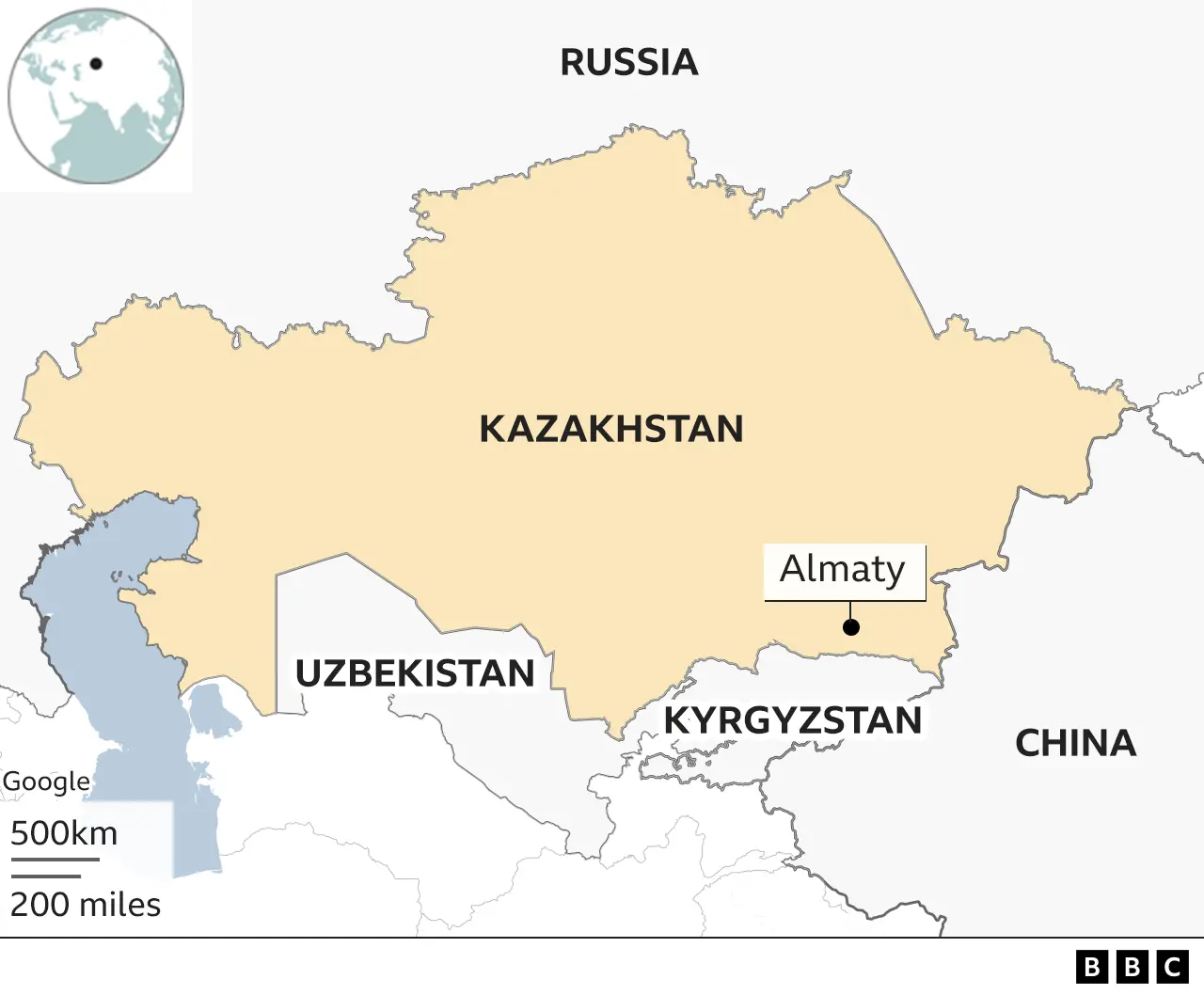Kazakhstan unrest: Dozens killed in crackdown
 Reuters
ReutersSecurity forces in the Central Asian state of Kazakhstan say they have killed dozens of anti-government rioters in the main city, Almaty.
They moved in after protesters tried to take control of police stations in the city, a police spokeswoman said.
Twelve members of the security forces have been killed and 353 injured in the unrest, sparked by a doubling in the cost of liquefied petroleum gas (LPG).
Russia is sending in troops at the request of the Kazakh president.
They will be deployed to help "stabilise" the country, which is a member of the Collective Security Treaty Organization (CSTO) along with Russia, Belarus, Tajikistan, Kyrgyzstan and Armenia.
The CSTO confirmed Russian paratroopers were being dispatched as peacekeepers, with advance units already deployed.
Protests began on Sunday when the government lifted its price cap on LPG, which many people use to fuel their cars, but the unrest has since spread to include political grievances.

Kazakhstan: The basics
Where is it? Kazakhstan shares borders with Russia to the north and China to the east. It is a huge country the size of Western Europe, dwarfing in land mass the other former Soviet republics of Central Asia.
Why does it matter? It has vast mineral resources, with 3% of global oil reserves and important coal and gas sectors. A mainly Muslim republic with a large Russian minority, it has largely escaped the civil strife seen in other parts of Central Asia.
Why is it making the news? Fuel riots have rocked the government, resulting in resignations at the top and a bloody crackdown on protesters.


- BACKGROUND: Kazakhstan country profile
- CONTEXT: Rare protests in a country that bans dissent

How dangerous has the unrest become?
Getting a clear picture of what is happening is proving difficult amid what monitoring groups describe as a "nation-scale internet blackout", and there are reports that security forces sided with protesters in some places.
Almaty police spokeswoman Saltanat Azirbek called on people in the city to stay at home temporarily as a "counter-terrorist" operation continued in three administrative buildings on Thursday.
Dozens of attackers were "eliminated" after they tried to storm police buildings in the city, she said, adding that weapons had been stolen by rioters.
About 1,000 people have reportedly been injured in the unrest, with 400 being treated in hospital and 62 in intensive care.
Protesters also targeted the mayor's office in Almaty and Kazakhstan's main airport, while water cannon were used against protesters in the western city of Aktobe.
President Kassym-Jomart Tokayev has imposed a nationwide state of emergency that includes a curfew and a ban on mass gatherings.
He also fired his powerful predecessor, Nursultan Nazarbayev, who held a national security role since stepping down as president, and the entire government also resigned.
Why is Russia getting involved?
President Tokayev accused foreign-trained "terrorist gangs" of being behind the trouble and announced he had sought help from the CSTO, an alliance of former Soviet states dominated by Russia.
The CSTO's current chairman, Armenian Prime Minister Nikol Pashinyan, said the alliance would send peacekeeping forces "for a limited period of time".
Video released by Russian media showed a small number of Russian soldiers boarding a military transport plane. According to the alliance, the peacekeeping force will be deployed to help protect state and military installations in Kazakhstan.
The CSTO was set up nearly 30 years ago, just after the collapse of the Soviet Union, as an alliance to counter external military threats.
In 2010, Russia rejected a request from Kyrgyzstan for the CSTO to send in peacekeepers when ethnic violence erupted there, saying it was an internal matter.
Why is fuel such a hot issue?
Some parts of Kazakhstan like the Mangistau region, where the protests started, rely on LPG (butane and propane) for refuelling as many as 90% of vehicles, Reuters news agency reports.
Despite being a major oil nation, Kazakhstan had regularly faced LPG shortages because producers got a better price exporting.
When the government removed its price cap on 1 January, prices reportedly rose from 50 ($0.11; £0.08) to 120 tenge per litre.
The government has since announced it is restoring the 50-tenge cap in Mangistau.

Burned down buildings and long queues
by Abdujalil Abdurasulov, BBC News, Almaty
The bustling square of Almaty has turned into a conflict zone, complete with burned down buildings and vehicles.
Many people are scared to go outside, especially at night because clashes are continuing. The sounds of shooting and explosions remind people how dangerous it can be to leave their homes.
Local vigilante groups block the entrances to their villages near Almaty to prevent looting. Checkpoints and makeshift barriers block the entrance to the city, so people are using narrow streets to get in and out of Almaty.
There are big queues at petrol stations. Residents are struggling to buy food because shopping malls, supermarkets, cafes and restaurants are all closed, only small shops are still open. And the internet shutdown continues, so people cannot withdraw money or top up their phones.

